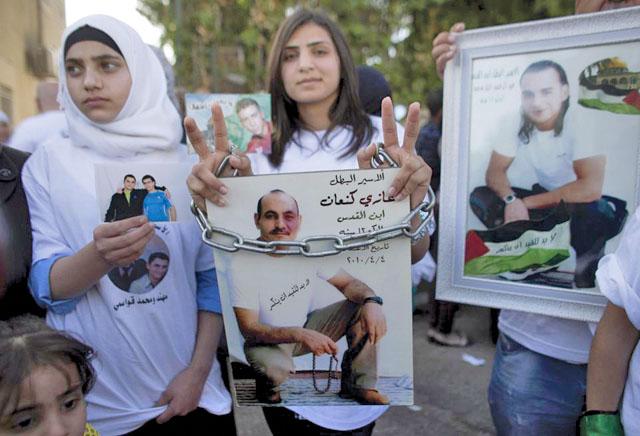You are here
Palestinian prisoners say hunger strike ‘only choice’
By AFP - Jun 25,2014 - Last updated at Apr 18,2020

RAMALLAH — Stuck indefinitely in Israeli jails, Palestinian prisoners see starving themselves — to death if necessary — as their only choice in the face of archaic detention laws.
During the night, dozens of prisoners who had refused food for 62 days ended their hunger strike following a deal with the Israel Prisons Service (IPS).
All were protesting over being held without trial or charge under procedure called administrative detention, which can last for years.
Although there were no immediate details on the deal, the IPS said it would not involve suspending administrative detention, a practice which has driven many to the brink of despair.
Nidal Labboum, one of the first to join the strike when it began on April 24, vividly recounts his ordeal a month after he was hospitalised and then released from Israeli custody.
“I lost around a quarter of my body weight during the strike. My own son didn’t even recognise me when I got out,” he said after 36 days of refusing food which left him exhausted, with viral infections and liver disease.
But 34-year-old Labboum, who spent 16 months locked up without being told why, said the strike was his only weapon against administrative detention.
“When a person is being oppressed, he will do anything. By striking, I just wanted to end my oppression — either by being freed, or to the point where I didn’t want to live anymore,” Labboum told AFP by telephone.
He was never given a reason for his arrest, nor for his eventual release.
‘Secret evidence’
“They accused me of belonging to Hamas, but I told them this wasn’t true... they kept me locked up telling me it was a ‘secret’ matter, and brought no charges against me.”
Fellow prisoner Rami Barghouthi refused food for 26 days, and was released late May after four months of detention without trial.
“I had headaches, joint and muscle pain, and I’m still suffering from pain today, in my intestines and in my stomach. I still can’t eat all foods,” Barghouthi said.
“Administrative detention is tyrannical. There are no accusations — anything they claim to have against you is a “secret”.”
“So the strike was the last resort and our only choice — even if it led to death.”
The Palestinian Prisoners Club says around 120 prisoners began the latest strike, and by the time the deal was struck, 75 of them were being treated in hospital due to their rapidly failing health, the IPS said.
Some of the strikers were kept alive with vitamins and sugars, but others took only water for the duration, according to prisoners’ rights group Addameer.
Administrative detention is a procedure that dates back to the British Mandate of Palestine (1920 to 1948), allowing detainees to be held without charge for indefinitely renewable six-month periods.
Rights groups have slammed Israel’s use of the colonial era laws, and the Palestinian leadership has urged international pressure on Israel to “annul” the procedure.
Although the army did not respond to an AFP request for comment, former IPS commissioner Orit Adato said holding prisoners without charge was the only way to protect Israel’s network of Palestinian informants.
“This procedure is used when it’s clear we have someone dangerous on our hands... but a trial would involve revealing our sources, putting them in danger,” she said.
The only right remaining
Of the 5,000 Palestinians held in Israeli prisons, around 200 are administrative detainees, but that number looks set to double following a vast arrest operation to find those behind the suspected kidnapping of three Israeli teenagers on June 12.
So far, Israel has arrested 371 Palestinians with most expected to be held without charge.
Amal Irhiyeh, mother of the youngest hunger striker, 19-year-old Ahmed Al Rimawi, despaired that the cycle would never end.
“Tomorrow, they’ll round up dozens of young men and go through the same motions, putting them in administrative detention and accusing them of belonging to Hamas,” she said.
Despite the risks, the families fully support their loved ones’ decision.
“At first I didn’t agree with it, but when I saw that this is a case of a person exercising the one right he has, I accepted it,” Irhiyeh said.
In a move aimed at thwarting future hunger strikes, Israel is rushing through a bill allowing the force-feeding of those in critical condition after refusing food, with a parliamentary vote due Monday.
Rights groups are up in arms over the bill, and the families are deeply concerned.
“It just denies them their rights, and denies them their only form of resistance,” said Sima Mutawalli whose fiance was one of those refusing food.
“Even if it saved my fiance’s life, I’d be against it.”
Related Articles
Dozens of Palestinian prisoners who had refused food for 62 days have suspended their hunger strike after reaching a deal with the Israel Prisons Service, their lawyer told AFP.
Palestinian and Israeli rights groups on Sunday wrote to EU foreign policy chief Catherine Ashton demanding her “urgent intervention” on behalf of 125 prisoners on long-term hunger strike.
OCCUPIED JERUSALEM — Israeli authorities have declared their intention to force feed a hunger-striking Palestinian, his lawyer said Saturday












